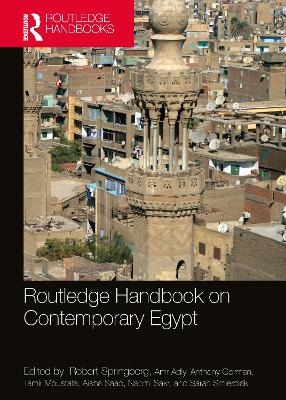
Routledge Handbook on Contemporary Egypt
Routledge (Verlag)
978-0-367-69439-5 (ISBN)
The macrohistory of Egypt is complemented by the microhistories of specific institutions and processes that constitute separate sections in this handbook. The chapters revolve around political economy: it is shaped by the people and their abilities, political and legal institutions, organization of the economy, natural and built environments, and culture and communication. Politics has been overwhelmingly authoritarian and coercive since the military seized power in 1952; consequently, the contributions address both the causes and consequences of unbalanced civil–military relations, military rule, and persisting authoritarianism in the political society.
This multidisciplinary handbook serves a dual purpose of introducing readers to Egypt’s history and contemporary political economy and as a comprehensive key resource for postgraduate students and academics interested in modern Egypt.
Robert Springborg is Adjunct Professor at the School of International Studies at Simon Fraser University and Nonresident Research Fellow of the Italian Institute of International Affairs. Formerly he was the Muhammad bin Issa (MBI) Al Jaber Professor in Middle East Studies at the School of Oriental and African Studies and Director of the American Research Center in Egypt. Amr Adly is Assistant Professor in the Department of Political Science at the American University in Cairo. He worked as a nonresident scholar at the Carnegie Middle East Center. He is the author of Cleft Capitalism (2020) and State Reform and Development in the Middle East (2012). His works have been published in a number of peer-reviewed journals. Anthony Gorman is Senior Lecturer in Islamic and Middle Eastern studies at the University of Edinburgh. He is the author of Historians, State and Politics in Twentieth-Century Egypt (2003), and (with Monciaud) The Press in the Middle East and North Africa, 1850–1950 (2018). He continues to work on a history of the Middle Eastern prison, and aspects of the Greek presence of modern Egypt. Tamir Moustafa is Professor of International Studies and Stephen Jarislowsky Chair at Simon Fraser University in Vancouver, Canada. He is the author of the award-winning book, The Struggle for Constitutional Power: Law, Politics, and Economic Development in Egypt (2007), and the co-editor of Rule by Law: The Politics of Courts in Authoritarian Regimes (2008). Aisha Saad is Research Scholar in Law and the Bartlett Research Fellow at Yale Law School. Dr. Saad was previously Assistant Professor of Public Policy at the American University in Cairo where she helped launch the Center for Sustainable Development and the region’s first Masters in Sustainable Development. Naomi Sakr is Professor of Media Policy at the Communication and Media Research Institute, University of Westminster, researching Arab journalism, cultural production, and human rights, including pan-Arab screen media for children. Her books include Transformations in Egyptian Journalism (2013) and reports on media laws and governance in the Arab region. Sarah Smierciak completed a DPhil in Oriental Studies and an MPhil in Development Studies at Oxford University on a Rhodes Scholarship. In 2016 she was awarded a Fulbright Grant to conduct research in Istanbul with Syrian and Iraqi communities. She is currently based in Cairo where she writes freelance political economy analysis and is finishing a travel guide to Egypt for the "Moon" series.
Introduction; PART I History Introduction: Occupation, independence, revolution; 1 Building the Egyptian state? Infrastructural systems, education, and urbanization (1919–2011); 2 The ideological roots of authoritarianism in Egypt; 3 Egypt’s foreign policy from Faruq to Mubarak; 4 Activism and contentious politics in Egypt: The case of the student movement; 5 Framing the past: Historian, state and society; PART II Politics Introduction: The evolution of military rule in Egypt; 6 Genesis of coup-proofing in Egypt: Civil–military relations under King Faruq and beyond; 7 The fingers of the "invisible hand": Egypt’s government institutions; 8 Islamism in Egypt; 9 Civil society and revolution (2000–present); 10 Egypt’s post-uprising foreign policy; PART III Economy Introduction: A brief history of nation, state, and market; 11 State–business relations in neoliberal Egypt: The global political economy of subordinate integration; 12 Why Egypt’s trade policy failed to improve its external competitiveness; 13 Egypt’s foreign direct investment regime: Evolution and limitations; 14 The political economy of workers’ remittances in Egypt; 15 Encroachments: Land, power and predation; PART IV Law and human rights Introduction; 16 Judges, elections, and constitutional politics after the 2011 Revolution; 17 Lawyers and politics: Lawyering and counter-lawyering in Egypt; 18 Law, exceptional courts and revolution in modern Egypt; 19 The Egyptian human rights movement: Between political autonomy and accommodation of authoritarianism; PART V Natural and built environments Introduction: Visions and realities of the struggle for development; 20 Sustainable water resource management in Egypt; 21 Egypt’s conflicting urbanism: Informality versus new desert development; 22 Livability of Egyptian cities; 23 The cultural heritage of Egypt’s cities: Burden or resource?; PART VI Media and popular culture Introduction: Divergent trajectories of creativity and coercion; 24 The culture police: Manning the barricades of allowable art and culture; 25 Media ownership in Egypt (2000–2020): Categories and configurations; 26 Tweeting the revolution: The evolution of social media use in Egypt’s turbulent times; 27 Ring-fenced religion? Egypt’s religious media between faith and politics; 28 Cooperativism, revolution and the ‘digital turn’: Assessing recent Egyptian film collectives; 29 The rise of indie music from the heart of Tahrir Square: Politics and popular music in Egypt
| Erscheinungsdatum | 10.07.2023 |
|---|---|
| Zusatzinfo | 20 Tables, black and white; 19 Line drawings, black and white; 1 Halftones, black and white; 20 Illustrations, black and white |
| Verlagsort | London |
| Sprache | englisch |
| Maße | 174 x 246 mm |
| Gewicht | 920 g |
| Themenwelt | Geschichte ► Teilgebiete der Geschichte ► Kulturgeschichte |
| Sozialwissenschaften ► Politik / Verwaltung | |
| ISBN-10 | 0-367-69439-5 / 0367694395 |
| ISBN-13 | 978-0-367-69439-5 / 9780367694395 |
| Zustand | Neuware |
| Haben Sie eine Frage zum Produkt? |
aus dem Bereich


